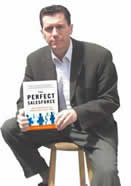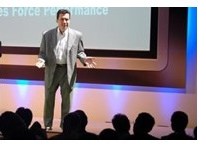| |
l
S t u f f f o r t h e p r e s s . . .
|
|
|
|
Excerpts of key points
Talent cannot be taught |
|
(From chapter 2):
l
The Gallup Organization has been studying top performance in human beings for over 30 years now. To date they have conducted detailed interviews with over 3 million participants, looking for common denominators in the world’s best teachers and nurses and managers and, yes, salespeople. Their definition of top performance dwarfs even my own. Gallup found that top performing salespeople sold between six and ten times more than their average counterparts.
Appreciate what you would learn if you were to conduct detailed interviews with 250,000 salespeople, in search of the common denominators of the top people. Gallup found unequivocally that selling is a natural born talent. Business degrees are not relevant to sales performance—in fact schooling of any kind is not relevant. Experience in your industry is also not relevant. Even past experience in sales in not a requisite—imagine! Only talent. And talent cannot be taught.
This is not a trivial finding. I’m willing to bet that just about every person reading this book who has hired salespeople in the past has listed as a job requirement experience in their industry or perhaps a certain minimum education; certainly sales experience. All irrelevant.
Mark is a salesman I worked with in a software company in 2001. He was in his early forties and, for reasons he called “internal politics,” had taken a sabbatical from his teaching position in the public school system. He had never been in sales; he had been a teacher his entire career. Within his first few months selling high-end corporate software, he was selling four to six times more than the other seven salespeople, all of whom had been at the job much longer and had a lot more in the pipeline. Four to six times more, each and every month.
Mark never had any sales training or previous experience at a sales job. There are Marks in most every company, and you must understand that their ability to achieve such numbers comes from having the natural talents that happen to perfectly suit their type of sale. They may have received training—and that training may well have augmented their performance—but in the absence of the talents needed for the task, these higher levels of performance are simply not possible.
l |
| A top performer at one sale type often performs poorly at a different sale type—and there are many sale types |
(From chapter 3):
l
Some salespeople love to prospect. Some salespeople hate it. Some salespeople love serving the same clients for years and years. Others need to win over new people all the time. There are those salespeople who excel at the long-term sale, where many meetings are needed to assemble many pieces of a solution with many participants from different departments—they love to orchestrate all of this. Then there are those who prefer the shorter sales cycle, which typically means many more sales, or “victories,” per period.
Some salespeople thrive on selling “concepts,” where others simply can’t do it, excelling instead with the consistency of unchanging product features and benefits. Some people love to convince others; they thrill to the challenge of converting others to their way of seeing things. Others thrive on fulfilling (or surpassing) the predetermined needs of their clients, and simply cannot sway other people’s opinions—they’re too empathetic. They make great servicers, but terrible closers.
There are an almost infinite number of combinations of these and a few other sale characteristics. Keep in mind why you need to make these distinctions: because of natural-born talent. Remember, if hiring a top salesperson was as easy as finding a known top producer and then training them to sell your product or service, well. . . everyone would just be doing it. We have established that selling is a natural-born talent. The problem is, with so many different combinations of the above sale characteristics, selling your product or service could be a completely different job than selling another product or service, thereby requiring a completely different set of talents.
--------------------------------------------------------
l
First, the typical job interview does nothing to uncover whether your candidate truly possesses whatever talents you are looking for (which we address in chapter five). The second flaw is with the identification of the talents themselves. Self starter, communication skills, team player, highly motivated—these “qualities” are not nearly specific enough. It is probably accurate to say that we would want to hire these qualities for all of the different sales jobs—perhaps for any job at all! You need to be far more precise in naming the talents you seek. You must learn how to hire people that are naturally “wired” for your exact sale type.
-------------------------------------------------------
l
Over the years I identified and refined 10 different selling talents. After you read their definitions you may realize that you have several different sale types within your organization—each requiring different talents—that are currently being executed by the same salespeople. This usually explains why you have salespeople that seem to always sell the same few products or services, and rarely sell others.
l |
| Conditions create behaviors; most companies do not understand performance conditions |
(From chapter 6):
l
Once again, a top performer is natural talent operating under specific conditions. Now that you’ve had three chapters of talent, chapters six through eight will describe the ideal performance conditions.
Make no mistake. The conditions are as important as natural talent. I have personally witnessed a shocking number of companies that lose top salespeople to an intolerable arrangement of these conditions and, quitting aside, I have witnessed an equal number of top talents that end up performing at only mediocre levels because of them. And I am not talking about whips being cracked over the heads of overworked salespeople hunched over a rotary phone in poor light and leaky ceilings, being screamed at by an abusive, cigar smoking tyrant. The large majority of these “intolerable conditions” completely elude executives, and certainly baffled my clients. Most of them felt the job, the pay, and the perks were very good. And they probably were.
There is almost no excuse for this misunderstanding. If you have managed to find and hire a top performer into the specific selling role for his or her talent set—you have accomplished something significant. Loosing this person due to a lack of understanding of their needs and wants is inexcusable.
-------------------------------------------------------
l
Workplace performance expert Dr. Dean Spitzer quotes a variety of disturbing surveys in his book Supermotivation (Amacom, 1995) including the fact that 84% of workers could perform significantly better if they wanted to, and a full 50% say they are exerting only enough energy to hang on to their jobs. So few employees today go anywhere near “above and beyond,” and most executives do not appreciate the financial impact this has. If you could stick a productivity barometer into any employee at a Best to Work For company, the reading would be at least double that of other companies. What would a group of these employees do to your numbers?
-------------------------------------------------------
l
Shaping, association, Pavlov, operant conditioning, consequence, reinforcement, stimulators, antecedents, motivators, triggers...
Why do people behave the way they do? What external influences and conditions alter that behavior? Today we have these answers. It has all been studied and formulated and yet it is so rarely applied in the workplace. If you work with other humans, you are subject to the laws of human behavior. Shouldn’t we all have at least a crash course in what really influences human behavior?
-------------------------------------------------------
l
Behavior analyst and nationally known performance expert Dr. Aubrey Daniels did a survey that suggested that 85% of the average manager’s job is spent either telling his people what to do, figuring out what to tell them to do, or deciding what to do about employees that weren’t doing what they were told. Many managers believe that’s the job description of a manager: to “keep after” their people. But it doesn’t work. If it did, performance would at some point raise to the desired level and the manager would no longer be spending 85% of the day chasing and telling. |
_____________________________________________________________ |
|
Author's bio |
For 30 years Derek Gatehouse has been on a mission. A mission t o uncover how some people are able to sell so much more than all their peers despite having had no training, and often no sales experience. A mission to understand how much impact sales training really has—on what type of person and under what conditions. And ultimately, a quest for a reliable system—where any owner or executive can learn how to assemble a sales force of top producers for their type of sale. o uncover how some people are able to sell so much more than all their peers despite having had no training, and often no sales experience. A mission to understand how much impact sales training really has—on what type of person and under what conditions. And ultimately, a quest for a reliable system—where any owner or executive can learn how to assemble a sales force of top producers for their type of sale.
Mr. Gatehouse began his sales career in 1975 and has since sold all types of products, services, tangibles, intangibles, benefits and concepts. He has sold to maintenance managers and to CEOs of  Fortune 100 companies. He has managed sales teams both as a sales manager and a VP Sales, in start ups, in the mid-market, and in billion dollar multi-nationals. He has worked with most every available personality profiling tool, management system and sales training available today. Fortune 100 companies. He has managed sales teams both as a sales manager and a VP Sales, in start ups, in the mid-market, and in billion dollar multi-nationals. He has worked with most every available personality profiling tool, management system and sales training available today.
Throughout the eighties and nineties Gatehouse applied his many findings with a variety of employers and in 1999—after a journey that includes having interviewed more than 2,000 business owners and executives about what is truly working in the sales force today—he founded Vendis Inc. and The Perfect SalesForce™ System. Since then Vendis has been helping owners and executives in all industries and sale types to build their own teams of top salespeople.
Mr. Gatehouse lives in Montreal with his wife and 2 children.
Consulting
Contact Derek Gatehouse
|
|
_____________________________________________________________ |
| Jacket cover and flaps |
| *Click each image to view |
|

l
Front cover |
 l
l
Back cover |

l
Front flap |
l

l
Back flap |
|
|
|


 o uncover how some people are able to sell so much more than all their peers despite having had no training, and often no sales experience. A mission to understand how much impact sales training really has—on what type of person and under what conditions. And ultimately, a quest for a reliable system—where any owner or executive can learn how to assemble a sales force of top producers for their type of sale.
o uncover how some people are able to sell so much more than all their peers despite having had no training, and often no sales experience. A mission to understand how much impact sales training really has—on what type of person and under what conditions. And ultimately, a quest for a reliable system—where any owner or executive can learn how to assemble a sales force of top producers for their type of sale.  Fortune 100 companies. He has managed sales teams both as a sales manager and a VP Sales, in start ups, in the mid-market, and in billion dollar multi-nationals. He has worked with most every available personality profiling tool, management system and sales training available today.
Fortune 100 companies. He has managed sales teams both as a sales manager and a VP Sales, in start ups, in the mid-market, and in billion dollar multi-nationals. He has worked with most every available personality profiling tool, management system and sales training available today.
